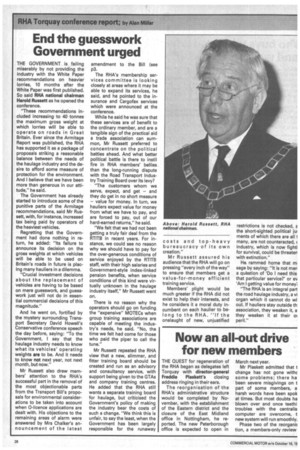End the guesswork Government urged
Page 20

If you've noticed an error in this article please click here to report it so we can fix it.
THE GOVERNMENT is failing miserably by not providing the industry with the White Paper recommendations on heavier lorries, 10 months after the White Paper was first published. So said RHA national chairman Harold Russett as he opened the conference.
"These recommendations included increasing to 40 tonnes the maximum gross weight at which lorries will be able to operate on roads in Great Britain. Ever since the Armitage Report was published, the RHA has supported it as a package of proposals striking a reasonable balance between the needs of the haulage industry and the desire to afford some measure of protection for the environment. And I believe that we have been more than generous in our attitude," he said.
The Government has already started to introduce some of the punitive parts of the Armitage recommendations, said Mr Russett, with, for instance, increased tax being paid by operators of the heaviest vehicles.
Regretting that the Government had done nothing in return, he added: "Its failure to announce its decision on the gross weights at which vehicles will be able to be used on Britain's roads in future is placing many hauliers in a dilemma.
"Crucial investment decisions about the replacement of vehicles are having to be based on mere guesswork, and guesswork just will not do in essential commercial decisions of this magnitude."
And he went on, fortified by the mystery surrounding Transport Secretary David Howell's Conservative conference speech the day before, saying: "To the Government, I say that the haulage industry needs to know what its vehicles' operating weights are to be. And it needs to know not next year, not next month, but now."
Mr Russett also drew members' attention to the RHA's successful part in the removal of the most objectionable parts from the Transport Bill's proposals for environmental considerations to be taken into account when 0-licence applications are dealt with. His objections to the remaining areas of alarm were answered by Mrs Chalker's announcement of the latest
amendment to the Bill (see P3.
The RHA's membership services committee is looking closely at areas where it may be able to expand its services, he said, and he pointed to the insurance and Cargofax services which were announced at the conference.
While he said he was sure that these services are of benefit to the ordinary member, and are a tangible sign of the practical aid a trade association can summon, Mr Russett preferred to concentrate on the political battles ahead. And what better political battle is there to instil fire in RHA members' bellies than the long-running dispute with the Road Transport Industry Training Board over its levy?
"The customers whom we serve, expect, and get — and they do get in no short measure — value for money. In turn, we hauliers expect value for money from what we have to pay, and are forced to pay, out of our hard-earned returns," he said.
"We felt that we had not been getting a truly fair deal from the RTITB in recent years. For instance, we could see no reason why we should have to pay for the over-generous conditions of service enjoyed by the RTITB staff, with their high salaries and Government-style index-linked pension benefits, when service conditions of this kind were virtually unknown in the haulage industry itself," Mr Russett went on.
There is no reason why the operators should go on funding the "expensive" MOTECs when group training associations are capable of meeting the industry's needs, he said. "No, the time we felt had come for those who paid the piper to call the tune."
Mr Russett repeated the RHA view that a new, slimmer, and fitter training board should be created and run as an advisory and consultancy service, with support being given to the GTAs and company training centres. He added that the RHA still wants a separate training board for haulage, but criticised the Government's policy of making the industry bear the costs of such a change. "We think this is unfair, to say the least, when the Government has been largely responsible for the runaway costs and top-heavy bureaucracy of its own creation."
Mr Russett assured his audience that the RHA will go on pressing "every inch of the way" to ensure that members get a value-for-money efficient training service.
Members' plight would be much greater if the RHA did not exist to help their interests, and he considers it a moral duty incumbent on each haulier to belong to the RHA. "If the onslaught of new, unjustified restrictions is not checked, a the Short-sighted political jib ments of which there are all 1 many, are not counteracted, c industry, which is now fighti for survival, could be threaten with extinction."
Ha rammed home that mi sage by saying: "It is not men a question of 'Do I need this that particular service?' or ev 'Am I getting value for money:
"The RHA is an integral part the road haulage industry, a vi organ which it cannot do wi out. If hauliers stay outside th association, they weaken it, a they weaken it at their cm peril."




















































































